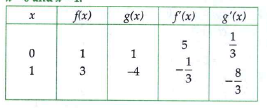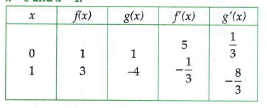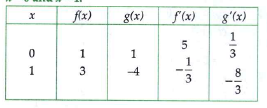Let f
be a function with continuous second derivative and f(0)=f′(0)=0.
Determine a function g
by
g(x)={f(x)x,x≠0;0,x=0
Then which of the following statements is correct?
a. g
has a continuous
first derivative
b. g
has a first
derivative
c. g
is continuous
but g
fails to have a
derivative
d. g
has a first
derivative but the first derivative is not continuousSolution in Bengali
Step by step video & image solution for Let f be a function with continuous second derivative and f(0)=f^(prime)(0)=0. Determine a function g by g(x)={(f(x))/x ,x!=0; 0,x=0 Then which of the following statements is correct? a. g has a continuous first derivative b. g has a first derivative c. g is continuous but g fails to have a derivative d. g has a first derivative but the first derivative is not continuous by Maths experts to help you in doubts & scoring excellent marks in Class 12 exams.
Updated on:21/07/2023Topper's Solved these Questions
Similar Questions
Given that A(1,1) and B(2,−3) are two points and D is a point on AB produced such that AD=3AB. Find the coordinates of D.
View SolutionCoordinates of points on curve 5x2−6xy+5y2−4=0 which are nearest to origin are
View SolutionLet f(x)=[x], where [.] is the greatest integer fraction and g(x)=sin x be two valued functions over R. Which of the following statements is correct? (a) Both f(x) and g(x) are continuous at x=0 (b) f(x) is continuous at x=0, but g(x) is not continuous at x=0. (c) g(x) is continuous at x=0, but f(x) is not continuous at x=0. (d) Both f(x) and g(x) are discontinuous at x=0
View SolutionIf f(x-y)=f(x).g(y)-f(y).g(x) and g(x-y)=g(x).g(y)+f(x).f(y) for all x in R. If right handed derivative at x=0 exists for f(x) find the derivative of g(x) at x=0
View SolutionLet f be a function with continuous second derivative and f(0)=f′(0)=0. Determine a function g by g(x)={f(x)x,x≠00,x=0 Then which of the following statements is correct? g has a continuous first derivative g has a first derivative g is continuous but g fails to have a derivative g has a first derivative but the first derivative is not continuous
View SolutionTwo functions f&g have first &second derivatives at x=0 & satisfy the relations,' f(0)=2/(g(0)),f'(0)=2g'(0)=4g(0),g
View SolutionLet f(x) be continuous in a neighbourhood of 'a' and g(a)≠0 g is continuous at x=a. Let f be a function such that f'(x)=g(x)(x−a)2, then :
View SolutionLet f(x)=[g(x)−g(a)x−ax≠0g'(a)x=a, where g is a function derivable at x = a, then at x = a :
View SolutionIf f(x−y)=f(x).g(y)−f(y).g(x) and g(x−y)=g(x).g(y)+f(x).f(y) for all x∈R . If right handed derivative at x=0 exists for f(x) find the derivative of g(x) at x =0
View SolutionLet f be a function with continuous second derivative and f(0)=f′(0)=0. Determine a function g by g(x)={f(x)x,x≠00,x=0 Then which of the following statements is correct? g has a continuous first derivative g has a first derivative g is continuous but g fails to have a derivative g has a first derivative but the first derivative is not continuous
View SolutionLet f be a function with continuous second derivative and f(0)=f′(0)=0. Determine a function g by g(x)={f(x)x,x≠00,x=0 Then which of the following statements is correct? g has a continuous first derivative g has a first derivative g is continuous but g fails to have a derivative g has a first derivative but the first derivative is not continuous
View SolutionIf f(x−y)=f(x).g(y)−f(y).g(x) and g(x−y)=g(x).g(y)+f(x).f(y) for all x∈R . If right handed derivative at x=0 exists for f(x) find the derivative of g(x) at x =0
View Solutionसमीकरण cos[2sin−1Cos(2tan−1x)]=0 से x का मान क्या होगा ।
View SolutionSuppose that the function f and g and their derivatives w.r.t. x have the following values at x=0 and x=1.
 . The derivative of f[g(x)] w.r.t. x at x=0 is _____
. The derivative of f[g(x)] w.r.t. x at x=0 is _____
View SolutionSuppose that the function f and g and their derivatives w.r.t. x have the following values at x=0 and x=1.
 . The derivative of g[f(x)] w.r.t. x at x=0 is _____
. The derivative of g[f(x)] w.r.t. x at x=0 is _____
View SolutionSuppose that the function f and g and their derivatives w.r.t. x have the following values at x=0 and x=1.
 . The derivative of f[x+g(x)] w.r.t. x at x=0 is _____
. The derivative of f[x+g(x)] w.r.t. x at x=0 is _____
View Solution
